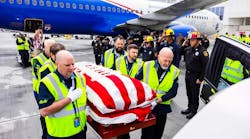Last week, the Federal Aviation Administration (FAA) announced its proposal to require similar drug and alcohol rules for personnel at repair stations located outside of the United States as those based domestically.
On Dec. 6, the FAA proposed “to require certificated repair stations located outside the United States whose employees perform safety-sensitive maintenance functions on certain air carrier aircraft to obtain and implement a drug and alcohol testing program.”
The logic behind this proposal is to align requirements with the drug and alcohol standards of the FAA and United States Department of Transportation (DOT).
“This would be an important step in our overall safety mission because few countries require testing of aviation or maintenance personnel. This rule would ensure these employees are held to the same high level of safety standards regardless of where they are physically located,” FAA officials said in a news release.
Representatives of the Teamsters Union voiced their support for the proposal.
“This is a critical step forward in ending our two-tiered aviation safety system, whereby mechanics in countries like China, El Salvador, Brazil and Singapore don't have to abide by the same rules as American aircraft technicians, who are among the most talented and knowledgeable in the world,” Joe Ferreira, Teamsters Airline Division Director, said in a press release. “There's a huge segment of the flying public that doesn't know that the airplane they are flying on might be repaired by someone who isn't subject to the same substance abuse screening as a technician in this country. When passengers find out about this, they are usually outraged and horrified.”
“This will go a long way towards onshoring aviation maintenance jobs by ending an economic incentive that puts the flying public at risk,” Bob Fisher, Teamsters Airline Division Deputy Director, added. “We will continue to oppose the outsourcing of the work in our craft and demand additional regulatory and statutory requirements to ensure airlines can't cut corners to save money overseas. We look forward to providing the FAA with our insights during the rulemaking process, and to the expeditious implementation of the mandate once it's finalized.”
The Transport Workers Union (TWU) also welcomed the decision.
TWU International President John Samuelsen issued a statement supporting the FAA’s announcement.
“This is a massive victory for U.S. airline passengers and workers. Airline mechanics in China and other lower-wage, lower-standard countries who work on U.S. commercial aircraft will have to undergo drug and alcohol testing – just like mechanics here. This closes a big safety gap that the Transport Workers Union and other unions have been urging the feds to close for decades,” he said.
The statement went on to say that every TWU member applauds FAA Administrator Michael Whitaker and United States President Joe Biden for issuing this rule, and encouraged the United States’ Congress to pass an FAA reauthorization bill that closes remaining safety and oversight gaps at foreign repair stations.
Richie Johnsen, Air Transport Territory General Vice President of the international President for the International Association of Machinists and Aerospace Workers (IAM), also praised the FAA’s announcement.
“Our hard-working members will be glad to know that all employees will be held to the same high safety standards and safety regulations set by the federal government. Our union takes great pride in maintaining the highest levels of safety in the aviation industry. The FAA did the right thing by ensuring that facilities overseas abide by such high U.S. standards,” he said.
Historically, however, similar proposals by the FAA have not been met with universal favor. When the FAA proposed drug and alcohol testing requirements in 2014, the Aeronautical Repair Station Association (ARSA) led a coalition of aviation trade associations to speak out against the proposal. The coalition included the Aerospace Industries Association (AIA), Airlines for America (A4A), the Cargo Airline Association (CAA), the General Aviation Manufacturers Association (GAMA), International Air Transport Association (IATA), the National Air Carrier Association (NACA) and the Regional Airline Association (RAA).
The coalition argued that international sovereignty, the health of the global aeronautical business community, and the safety of the flying public worldwide were at stake.
Daniel Fisher, then ARSA’s vice president of legislative affairs, told AviationPros: “ARSA steadfastly believes mandating drug and alcohol testing of maintenance providers is unnecessary and burdensome with no flight safety benefit. Unfortunately, for many years, labor unions, opposed to contract maintenance, successfully lobbied the FAA and Congress to mandate onerous requirements on repair stations, including drug and alcohol testing.”
He also noted a similar attempt in 2007 was challenged – “Industry and foreign civil aviation authorities (CAAs), such as the European Aviation Safety Agency (EASA), fought these efforts, amid the threat of the European Union-United States Bilateral Aviation Safety Agreement (BASA) collapsing.”
Read ARSA’s full comments to the FAA regarding the 2014 proposal here.
ARSA has not made a statement on the current FAA proposal but, “encourages its members to review the agency’s proposal and also the industry’s past work regarding drug and alcohol testing requirements.”
Comments on the FAA’s proposal are due on Feb. 5, 2024.



